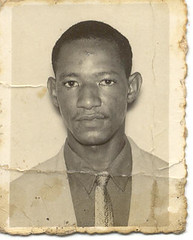I guess it must be synchronicity. Just earlier this afternoon I was thinking about the death penalty and the criminal justice system. In principle, I'm certainly not opposed to the death penalty. Every once in a while out there in the world we can read about individuals who are so evil that they most definitely lose their I'm- a- decent- human- being- who- should- be- given- the- benefit- of- the- doubt- id- card.
At the same time, the criminal justice system (I always have "trouble" trying to diagram that phrase) is clearly perverted by classism and racism. An adequate defense is often only available to those who can afford it. And there have been far too many people wrongly convicted of crimes they didn't commit and even put on death row. (Only recently, some have been released due to DNA evidence or other forms of new information). Several years ago, Illinois wisely decided to put a moratorium on the death penalty, and hopefully more states will follow suit, at least until the deeper problems can be adequately addressed.
Which brings us to Johnnie Cochran; who came to national prominence in the OJ Simpson trial by proving to the country that a rich Black man's money can buy justice as easily as a rich white man. It's not exactly Martin Luther King's dream, but sadly enough, it actually represents progress.
(Recently, a white acquaintance of mine was telling me that just a few years ago when a rich black family tried to build a house in his affluent suburb, the construction site was subjected to arson 3 times to prevent the neighborhood from integrating)
Cochran continued to gain fame by defending several famous, and even iconic, black men, like P. Diddy, Michael Jackson, Todd Bridges, Tupac Shakur, Snoop Dogg, and most significantly Geronimo Ji Jagga Pratt (the former Black Panther, and political prisoner who fell victim to Hoover's COINTELPRO and spent nearly 27 years wrongfully imprisoned for murder until he was released, in part, due to Cochran's efforts. Ironically, Cochran actually participated in Pratt's unsuccessful defense the first time around. And even more ironically, part of his alibi which proved his innocence was the fact that government officials had him under surveilance at the time and knew that he wasn't anywhere near where the crime was commited)
Anyway, with Johnnie Cochran gone, it will be just a little harder for the brothers to get a fair trial in court. He will definitely be missed.
R.I.P.
At the same time, the criminal justice system (I always have "trouble" trying to diagram that phrase) is clearly perverted by classism and racism. An adequate defense is often only available to those who can afford it. And there have been far too many people wrongly convicted of crimes they didn't commit and even put on death row. (Only recently, some have been released due to DNA evidence or other forms of new information). Several years ago, Illinois wisely decided to put a moratorium on the death penalty, and hopefully more states will follow suit, at least until the deeper problems can be adequately addressed.
Which brings us to Johnnie Cochran; who came to national prominence in the OJ Simpson trial by proving to the country that a rich Black man's money can buy justice as easily as a rich white man. It's not exactly Martin Luther King's dream, but sadly enough, it actually represents progress.
(Recently, a white acquaintance of mine was telling me that just a few years ago when a rich black family tried to build a house in his affluent suburb, the construction site was subjected to arson 3 times to prevent the neighborhood from integrating)
Cochran continued to gain fame by defending several famous, and even iconic, black men, like P. Diddy, Michael Jackson, Todd Bridges, Tupac Shakur, Snoop Dogg, and most significantly Geronimo Ji Jagga Pratt (the former Black Panther, and political prisoner who fell victim to Hoover's COINTELPRO and spent nearly 27 years wrongfully imprisoned for murder until he was released, in part, due to Cochran's efforts. Ironically, Cochran actually participated in Pratt's unsuccessful defense the first time around. And even more ironically, part of his alibi which proved his innocence was the fact that government officials had him under surveilance at the time and knew that he wasn't anywhere near where the crime was commited)
Anyway, with Johnnie Cochran gone, it will be just a little harder for the brothers to get a fair trial in court. He will definitely be missed.
R.I.P.


